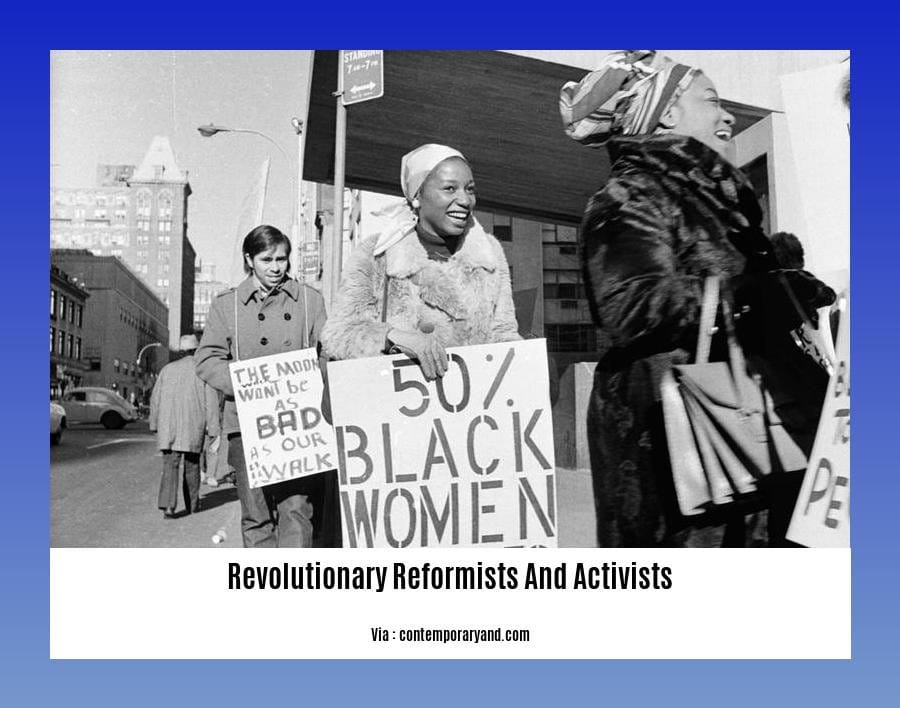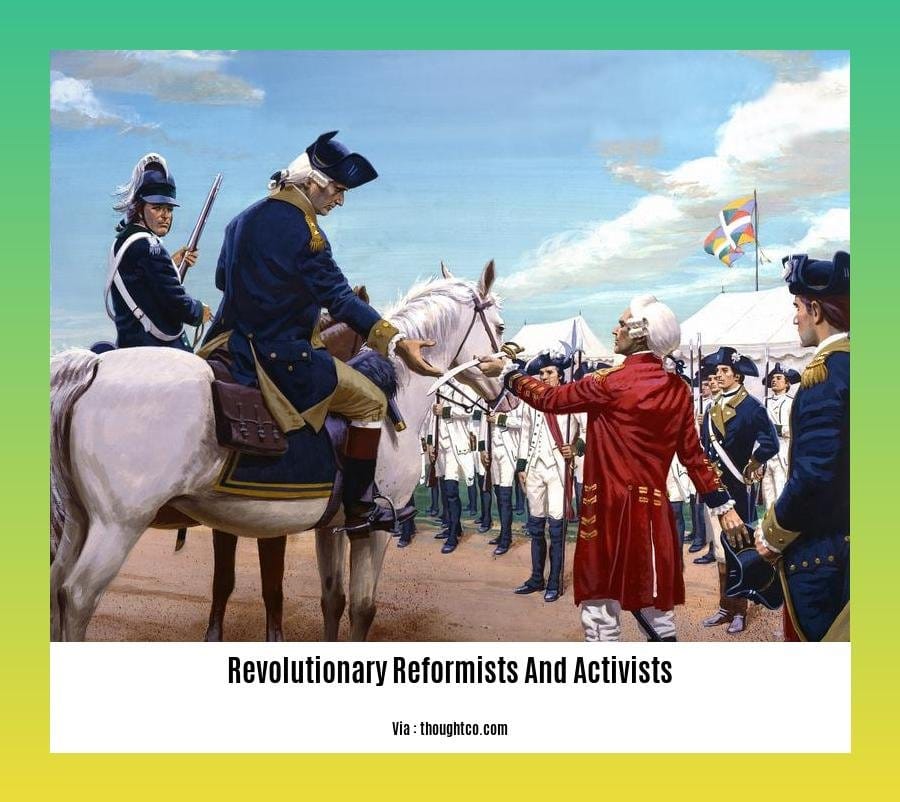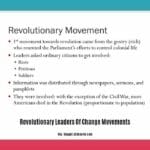Introducing “Revolutionary Reformists and Activists: Agents of Transformative Change,” a groundbreaking article that unlocks the secrets behind the fearless individuals who are shaping our world. Join us as we explore the motivations, tactics, and profound impact of these change-makers, revealing their essential role in the relentless pursuit of a better future. Dive into the captivating stories of those who dare to challenge the status quo, empowering you with insights and inspiration to become an active agent of transformative change in your own community.

Key Takeaways:
- Progressive Era: Reformers believed in improving society through government intervention, emphasizing science, education, and social change.
- Problems of Industrialization: Capitalism led to unsafe working conditions, inequality, and pollution.
- Progressive Accomplishments: Federal Reserve, food and drug regulations, national parks, child labor laws, public education.
- Dark Side of Progressivism: Nativism, forced sterilization, eugenics.
Revolutionary Reformists and Activists: Agents of Transformative Change
These individuals are the driving force behind social progress, tirelessly challenging the status quo and pushing for a more just and equitable world. Inspired by a deep sense of social responsibility and a belief in the power of collective action, revolutionary reformists and activists dedicate their lives to fighting oppression, promoting human rights, and envisioning a better future for all.
Motivations
Revolutionary reformists and activists are fueled by a profound sense of injustice and a deep-seated belief in the inherent equality and dignity of all human beings. They are driven by a range of motivations, including:
- Social Justice: They believe that every individual deserves equal opportunities, rights, and protections, regardless of their background or circumstances.
- Economic Equality: They advocate for a fairer distribution of wealth and resources, arguing that extreme inequality undermines social cohesion and prevents people from reaching their full potential.
- Political Empowerment: They seek to empower marginalized groups by increasing their participation in decision-making, challenging systems of oppression, and giving them a voice in shaping their own destiny.
Strategies
Revolutionary reformists and activists employ various strategies to achieve their goals, including:
- Grassroots Mobilization: They mobilize communities and build alliances to create a broad base of support for change, recognizing that collective action is more powerful than individual efforts.
- Direct Action: They engage in peaceful or disruptive actions, such as protests, strikes, and boycotts, to raise awareness about pressing issues, demand accountability, and force those in power to listen to the voices of the marginalized.
- Legislative Advocacy: They work with policymakers to pass laws and policies that advance social justice and equality, using the democratic process to bring about systemic change.
- Electoral Politics: Some revolutionary reformists and activists engage in electoral politics by running for office or supporting candidates who align with their values, recognizing the importance of shaping policy from within the system.
Impact
Throughout history, revolutionary reformists and activists have played a pivotal role in shaping societies and achieving significant social progress:
- Abolition of Slavery: They fought tirelessly for the abolition of slavery, challenging the moral and economic justifications for this abhorrent practice and ultimately securing the freedom of millions.
- Establishment of Labor Unions: They organized workers to form unions, giving them a collective voice to demand better working conditions, fair wages, and protection against exploitation.
- Extension of Voting Rights: They campaigned for the extension of voting rights to all citizens, regardless of race, gender, or background, expanding democratic participation and giving a voice to those who had been historically excluded.
- Enactment of Civil Rights Legislation: They played a central role in the civil rights movement, fighting for the desegregation of public spaces, the end of discrimination, and the full and equal rights for all citizens.
Despite the progress that has been made, revolutionary reformists and activists continue to face challenges:
- Resistance from Vested Interests: Those who benefit from existing power structures often resist efforts to redistribute wealth and empower marginalized groups, seeking to maintain their privileged positions.
- Media Bias: Mainstream media outlets may downplay or distort the efforts of activists, limiting public awareness and support for their causes.
- Co-optation: Sometimes, activists’ ideas are co-opted by the establishment, watering down their transformative potential and limiting their ability to bring about meaningful change.
Despite these obstacles, revolutionary reformists and activists remain steadfast in their commitment to social justice and transformative change. They continue to inspire countless others to join the fight for a more equitable and just world, proving that even the most formidable challenges can be overcome when people come together to demand a better future for all.
Check out our article on social revolutionaries who pioneered reform movements to learn about their fascinating impact on society.
Interested in the figures who changed the world? Dive into our article on the pioneering revolutionaries behind reforms.
Explore the inspiring stories of the revolutionary leaders of change movements in our detailed article.
Strategies Employed by Activists
From Boycotts to Policy Advocacy: How Activists Drive Change
Activists play a crucial role in the fight for social justice, equality, and transformative change. Their passion, strategies, and dedication have inspired countless movements throughout history. But what are the Strategies Employed by Activists to effect change?
Key Tactics:
- Boycotts: Refusing to purchase or use products or services from organizations that violate ethical or social principles.
- Protests and Direct Actions: Utilizing demonstrations, marches, and nonviolent actions to raise awareness and demand change.
- Grassroots Organizing: Mobilizing local communities and building alliances to gain support and create a collective voice.
- Policy Advocacy: Engaging with policymakers and elected officials to influence laws and policies that align with their goals.
- Electoral Politics: Running for office or supporting candidates who champion their platform.
Additional Insights:
- Citizen, Rebel, Change Agent, Reformer: Activists assume various roles within social movements, depending on their approach and goals.
- Corporate Influence: Activist pressure has contributed to the establishment of social responsibility policies and committees within corporations.
- Reform vs. Revolution: Activists may employ both reform strategies (gradual changes within the system) and revolutionary strategies (complete systemic transformation).
- Policy Agendas: Even radical activists often engage in policy-making and formulate specific policy agendas to address immediate issues.
Key Takeaways:
- Activists use a wide range of strategies to raise awareness, mobilize support, and influence decision-makers.
- Boycotts, protests, and grassroots organizing empower communities to demand change.
- Policy advocacy and electoral politics allow activists to directly shape policies and laws.
Related Reading:
Impact of Revolutionary Reformists and Activists
From the depths of history, revolutionary reformists and activists have emerged as beacons of social transformation, challenging the status quo and striving for a more just and equitable world. Their impact on shaping society has been profound, leaving an indelible mark on the course of human progress.
Motivations and Strategies
Driven by an unwavering belief in social justice, equality, and empowerment, these fearless individuals employ diverse strategies to enact change. They mobilize communities, engage in peaceful protests and disruptive actions, advocate for progressive policies, and participate in electoral politics.
Impact on Social Progress
The impact of revolutionary reformists and activists has been instrumental in advancing social progress throughout history. They have played pivotal roles in abolishing slavery, establishing labor unions, extending voting rights, and securing civil rights legislation.
Challenges and Resistance
Despite their tireless efforts, revolutionary reformists and activists face formidable challenges. Vested interests, media bias, and the co-optation of their ideas pose significant obstacles to their success.
Key Takeaways:
- Revolutionary reformists and activists advocate for transformative societal change through policies and actions.
- They are driven by motivations of social justice, economic equality, and political empowerment.
- Strategies include grassroots organizing, direct action, legislative advocacy, and electoral politics.
- Their impact on social progress includes abolishing slavery, establishing labor unions, and securing civil rights legislation.
- Despite facing challenges, their unwavering commitment to change continues to inspire hope and action.
Citation:
Kellogg Insight: How Do Activists Create Change?
Contemporary Challenges Faced by Activists
Revolutionary reformists and activists are unwavering advocates for change, striving to make the world a more just and equitable place. However, their path is often fraught with significant challenges.
Rising Polarization and Backlash
The ever-widening political divide has made it increasingly difficult for activists to find common ground and build consensus. Opponents of progressive movements often resort to fear-mongering and personal attacks, creating a hostile climate for activists to operate in.
Co-optation and Tokenism
Corporations and governments have become adept at co-opting activist language and imagery for their own benefit. They may make superficial gestures toward social justice issues to appease critics without addressing the underlying systemic inequalities. This co-optation can dilute the impact of genuine activist movements.
Repression and Criminalization
In many countries, activists face the threat of arrest, imprisonment, and even violence. Governments may pass laws that restrict the right to protest, silence dissent, and criminalize activism. This repression poses a serious threat to the safety and well-being of activists.
Funding Challenges
Funding is a major hurdle for activist organizations. They often rely on donations and grants, which can be uncertain and unreliable. This can limit their ability to sustain their operations and implement long-term strategies.
Burnout and Self-Care
Activism is a demanding and emotionally taxing pursuit. Activists may experience burnout, compassion fatigue, and other mental health challenges. Prioritizing self-care is essential to prevent activists from becoming overwhelmed.
Key Takeaways:
- Activists face a range of contemporary challenges, including polarization, backlash, co-optation, repression, and funding issues.
- The rise of social media has both empowered activists and presented new challenges, such as misinformation and cyberbullying.
- Despite the challenges, activists remain resilient and continue to fight for a just and equitable world.
Citation:
The Guardian: How can activists change the world? Experts offer seven strategies
















